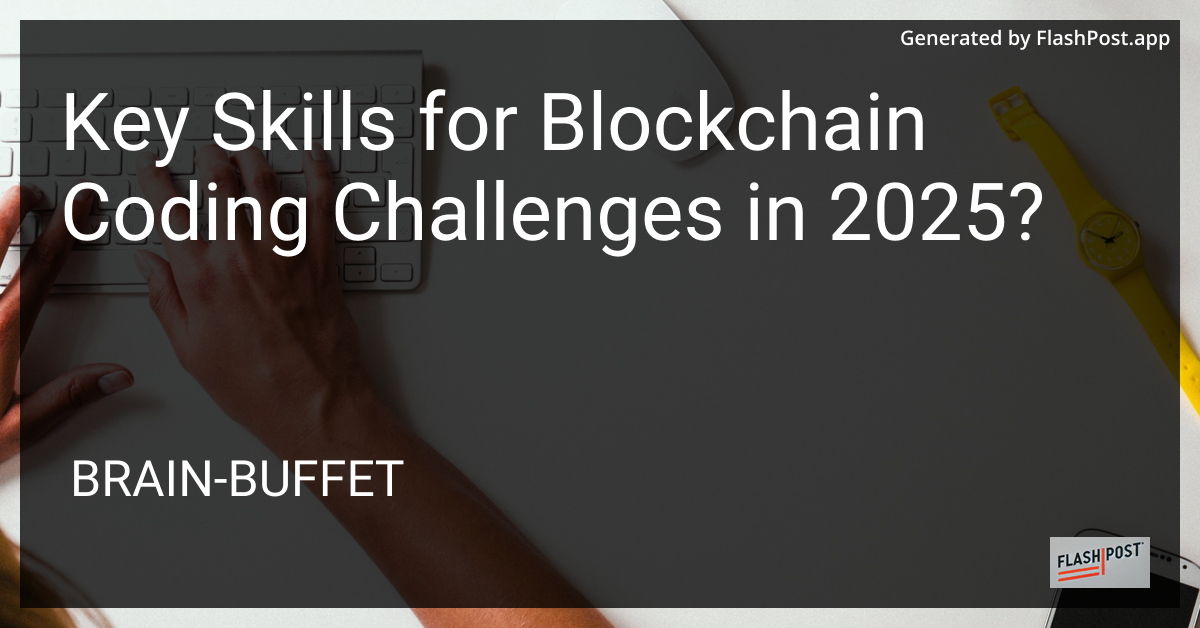Key Skills for Blockchain Coding Challenges in 2025?

Best Blockchain Books to Buy in 2025
| Product | Features | Price |
|---|---|---|
 Mastering Blockchain: Inner workings of blockchain, from cryptography and decentralized identities, to DeFi, NFTs and Web3, 4th Edition |
Don't miss out ✨  |
|
 Blockchain: The Comprehensive Guide to Blockchain Development, Ethereum, Solidity, and Smart Contracts (Rheinwerk Computing) |
Don't miss out ✨  |
|
 The Basics of Bitcoins and Blockchains: An Introduction to Cryptocurrencies and the Technology that Powers Them (Cryptography, Derivatives Investments, Futures Trading, Digital Assets, NFT) |
Don't miss out ✨  |
|
 The Bitcoin Standard: The Decentralized Alternative to Central Banking |
Don't miss out ✨  |
|
 Blockchain For Dummies |
Don't miss out ✨  |
Blockchain technology continues to evolve rapidly, and as we move towards 2025, the landscape of blockchain coding challenges is set to become more complex and varied. Whether you are a seasoned developer or new to the field, understanding the essential skills required for tackling these challenges is crucial. This article explores the key skills for blockchain coding challenges in 2025, focusing on programming languages, platform understanding, and the ability to navigate training resources.
Proficiency in Blockchain Programming Languages
One of the most significant skills for blockchain developers is a strong command of blockchain-specific programming languages. As of 2025, languages like Solidity, Rust, and Go remain highly relevant. Understanding the nuances of each language is vital for building efficient and secure blockchain applications. Learn more about what programming languages are used in blockchain.
Solidity: The Language of Smart Contracts
Solidity continues to be the go-to language for developing smart contracts, particularly on the Ethereum platform. A deep understanding of Solidity syntax and best practices is crucial for ensuring your contracts are robust and secure.
Rust and Go: The Performance Powerhouses
Rust and Go are increasingly popular for blockchain development due to their performance efficiency and safety features. Mastering these languages enables developers to build high-performance applications on platforms that support them, such as Polkadot and Hyperledger.
Understanding Blockchain Platforms
Successful developers need to comprehend the difference between public and private blockchain platforms. This understanding informs the choice of platform and influences design decisions.
Public vs. Private Blockchains
Each type of blockchain, whether public like Bitcoin or private like Hyperledger, has its own set of characteristics and requirements. Developers should tailor their approach based on the type of blockchain they are working within, considering factors such as access control, transaction validation, and scalability.
Navigating Blockchain Training Resources
The blockchain domain is ever-changing, and keeping up with the latest advancements is paramount for success. Numerous blockchain training resources are available, offering courses, webinars, and tutorials to enhance skills and keep developers at the forefront of technology.
Continuous Learning
Engaging in continuous learning through trusted resources ensures developers are equipped with the latest tools, frameworks, and methodologies, thus enabling them to meet the demands of modern blockchain coding challenges.
Conclusion
As blockchain technology advances, the complexity of coding challenges will intensify. Developers aiming to excel in 2025 must focus on mastering specific programming languages, understanding the nuances of different blockchain platforms, and committing to a path of continuous learning. By honing these skills, developers will be well-prepared to face the evolving landscape of blockchain challenges head-on. ```
This Markdown document provides an SEO-optimized and informative piece on the essential skills needed for blockchain coding challenges in 2025, interspersed with relevant links and structured for easy readability.